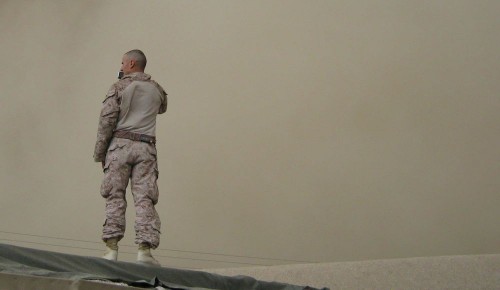To Combat Veteran Underemployment, Let’s Make the Transition Into the Civilian Workforce Smoother

Unemployment rates for veterans have been falling in recent years, declining from a high of close to 9 percent in 2010 to roughly 4 percent today. However, as the Military Times reports, many veterans still struggle with underemployment, especially those who belong to the post-9/11 generation of veterans.
There are many factors contributing to the high number of underemployed veterans, including communication barriers between civilian employers and veteran candidates. Because the military and the civilian workforce have very different cultures and norms, it can be hard for a civilian employer to understand how a veteran candidate’s experience can translate to their workplace. Similarly, it can be difficult for veteran candidates to sell their skills and expertise in ways that meet the expectations of civilian employers.
While the transition from military to civilian life can be difficult, there are ways for veterans and employers to work together toward mutually beneficial solutions. To gain some insight into this matter, we spoke with two experts in the field:
Jaynine Howard is a Recruiter Today contributor, career strategist, founder of JJ Howard & Associates, and a military veteran.
Dr. Tony Petrucci is a professor of HR at Temple University, developer of the performance review app DevelapMe, and a military veteran.
Below, check out Howard’s and Dr. Petrucci’s advice to veterans and employers about how to smooth the transition from military to civilian life:
Speaking the Civilian Employer’s Language
As mentioned earlier, one major challenge many veterans face is showing employers the value their military experience brings to the table.
Dr. Petrucci suggests veterans begin showcasing their value by first familiarizing themselves with the modern business ecosystem.
“[Veterans] need to be educated on current trends in business such as big data, real-time feedback, digital marketing, and millennials,” Dr. Petrucci says. “They need to be tech-savvy.”
Armed with this background knowledge, veterans can begin “to draw parallels, without overdoing it, from their military experience and skills to the relevant civilian experience and skills such as leadership, training and development, and financial management,” Dr. Petrucci says.
Howard agrees, urging veterans to determine which civilian jobs are equivalent – or at least close – to their military occupational specialties. She recommends using O*NET to research careers and identify relevant titles and keywords in the civilian workforce.
“The person reading your resume must be able to understand what [you] can do,” Howard says. “Using civilian job titles and duties is the first step. Veterans need to remember that the reader may not know what they did in the military, so they need to be very specific and use civilian language if the employer is a civilian employer.”

“This can be done by applying the ‘so what?’ principle to each bullet on your resume,” Howard explains. “Often, people put everything they have ever done on their resumes, but this leaves the reader thinking, ‘So what?’ Answering the ‘so what’ is done by showing results or accomplishments.”
For example, replace the vague “Streamlined office procedures” with “Increased productivity by 25 percent by streamlining the incoming document procedures.”
Look in the Right Places
When searching for civilian employment, veterans may want to pay special attention to certain industries and fields where their skills are more likely to be in demand.
Dr. Petrucci recommends veterans look at human-capital-intensive businesses where their leadership skills can really shine, as well as industries that rely heavily on logistics, such as transportation and security.
“The military is very system- and process-driven, so there is good transferability there,” Dr. Petrucci says.
Howard suggests veterans reach out to manufacturers of any special equipment they may have worked closely with in the military, as their knowledge will go a long way in proving their value right off the bat. She also cautions against automatically gravitating toward companies that advertise themselves as “veteran-friendly.”
“Many companies will profess they are ‘military-friendly,’ but be careful and find out what that really means,” Howard says. “Some companies hire veterans, but the positions are part-time and [pay] minimum wage.”
Dr. Petrucci notes there are many recruiting firms and other organizations specializing in veteran employment. He says veterans should turn to organizations like Military.com and Helmets to Hardhats for more career guidance and possible placements.
In addition, “many corporations have specific points of contact for veteran recruits, and veterans should search for them and contact them,” Dr. Petrucci says.
Howard urges veterans to take advantage of the resources offered by the military itself.
“Each branch of the military offers a transition assistance program,” Howard says. “It is often a requirement to attend these programs. Attend! Not just once, but twice. Be open to the information that is being shared. Get business cards from the speakers and connect on LinkedIn.”
From there, Howard says it can be useful to check out local career and education fairs.
“Go and talk to the representatives and collect brochures and business cards for those that look promising,” she says.
Veterans with active security clearance can check out ClearedJobs.net. Those who really enjoyed what they did with the military may want to search USAJobs for employment with the federal government.

According to Howard, low self-esteem is another challenge many transitioning veterans face, although this particular problem gets little coverage.
“After years of being in leadership positions and being known for your expertise … once you leave the military, you are just another average person in the sea of many,” Howard says. “I warn my clients that after no longer being in the military for about a month, they can expect to see their self-esteem and self-worth take a big drop. They need to prepare for this.”
Howard recommends volunteering in the community as one way to combat falling self-esteem, but there are many options. It’s all about finding a new purpose, she says. Going back to school, learning new skills, honing existing skills – anything that gives direction can help.
Finding a mentor can also help veterans stay confident as they navigate their new civilian lives. Plus, that mentor may even lead to employment.
“You need to find a mentor who has transitioned themselves to help you learn the language and develop your networks,” Dr. Petrucci says.
What Employers Can Do
For best results, employers should really meet veterans halfway. One way they can do that is by actively incorporating veterans into their recruiting processes and employer branding initiatives, Dr. Petrucci says.
“Hire a veteran from military recruiting for your recruiting team,” he suggests. “Build relationships with a number of firms that specialize in recruiting from the military. Educate internally on the value of hiring veterans.”
Howard says employers must be careful of giving veterans false hope. They should set very clear expectations in their job announcements so that veterans – and all job seekers – know what they’re getting into.
“If you are only collecting resumes to keep on file for future job openings, be very clear in the job announcement about this,” Howard says. “[Don’t] spend hours or have multiple phone calls with a candidate to later say, ‘We don’t have a job for you just yet.’ This gets someone’s hopes up, only to have them crushed. Time is money. The job applicant’s time is valuable. The time they spend on interviews and phone calls for jobs that do not exist is time they could be spending connecting with an employer who will hire them now.”
Howard urges employers to consider the interview process can be expensive for candidates, especially underemployed veterans. Organizations should take steps to mitigate the costs.
“In the past, I have had clients spend their last dime to drive several hours for an interview, thinking from the phone conversation or email that they were a shoo-in for the job, only to arrive and find out it was a group interview and the job was not even close to their skill set,” Howard says. “Many times, job applicants do not have the extra gas money or money for daycare to attend job interviews. Respect their time.”

